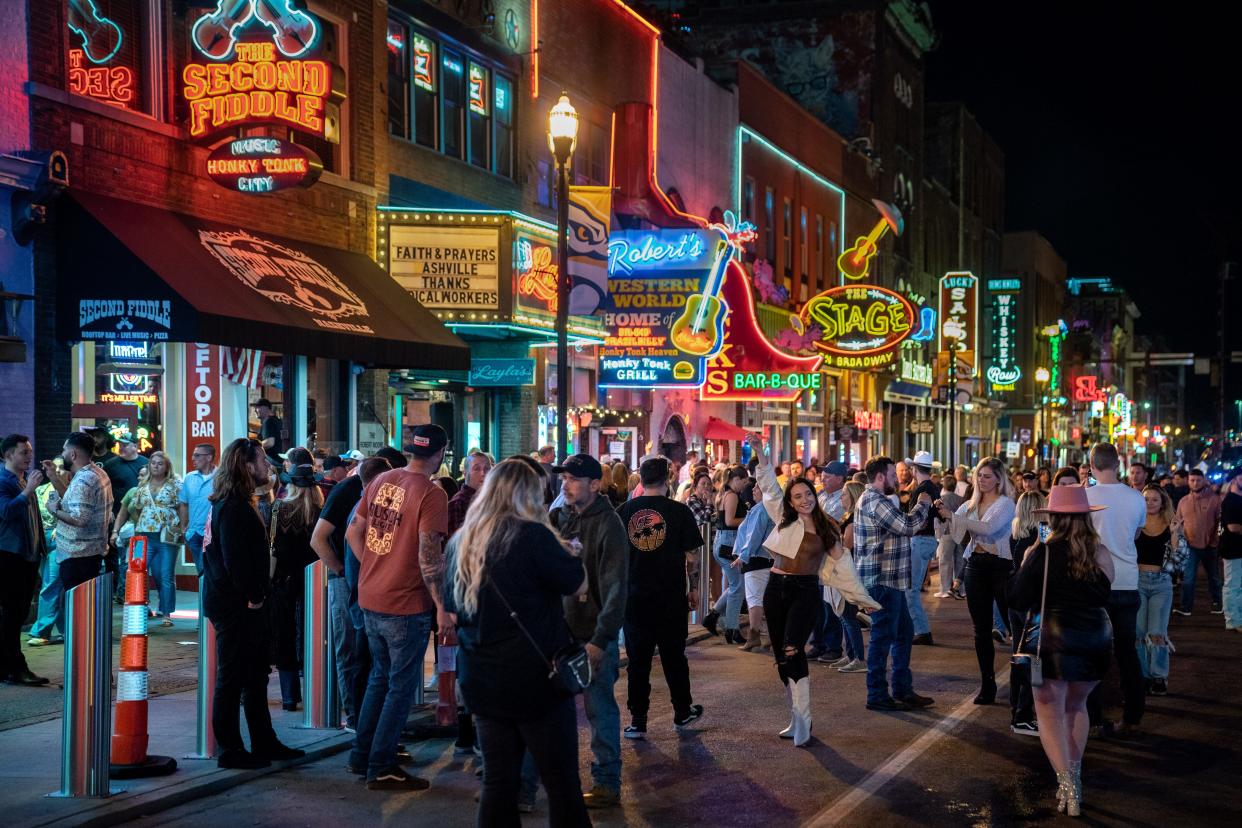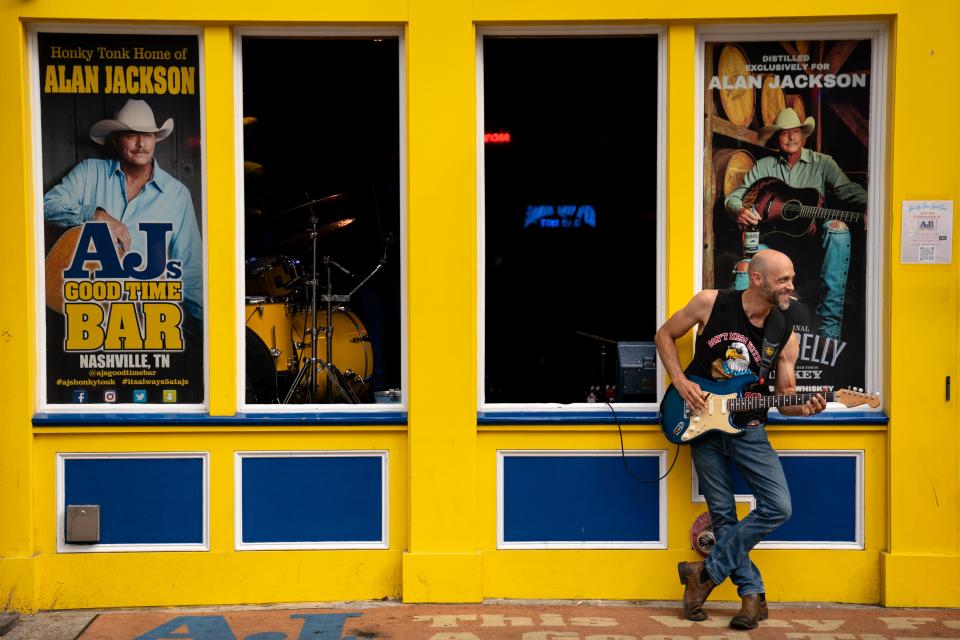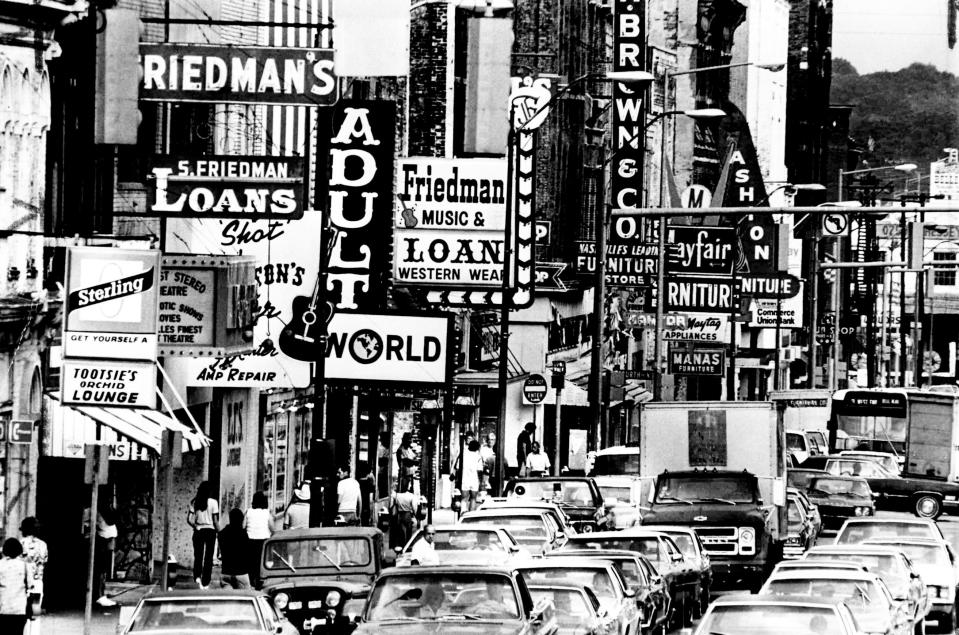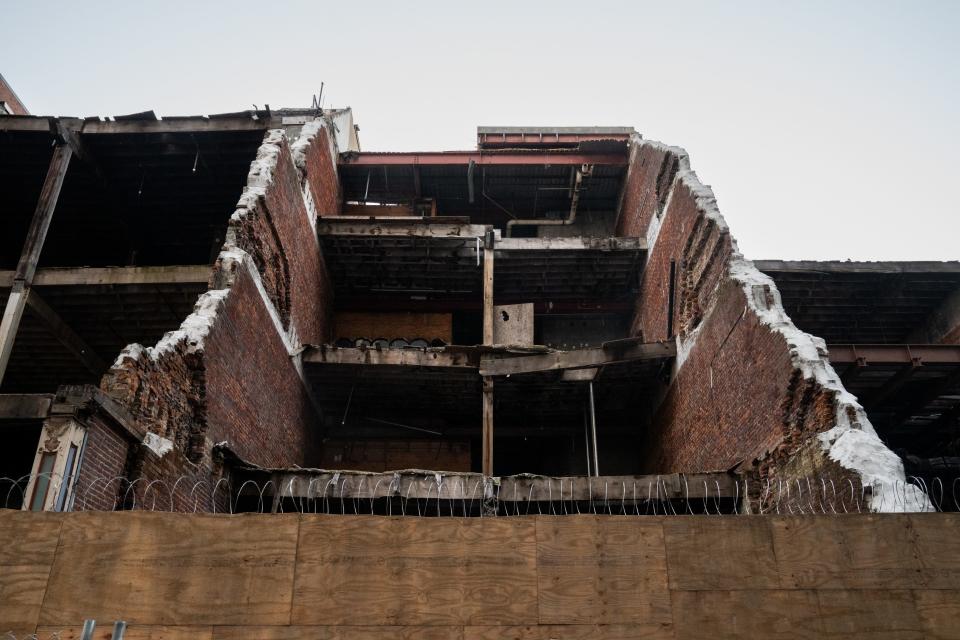'Time for a refresh': Even Nashville tourists think downtown's vibe is off

Kaitlyn Galicki, a seasoned Music City tourist from New Jersey, noticed the transformation downtown during her quest for the perfect pair of black cowboy boots on Lower Broadway recently.
Over the past 50 years, Nashville has experienced a renaissance despite major setbacks. The Mother Church of Country Music was nearly torn down, there was a 1,000-year flood, and a downtown bombing destroyed a 2nd Avenue block.
Today, Ryman Auditorium and the surrounding urban core is a premier U.S. destination that contributed a quarter of the county's sales tax revenues, or $148 million, this year. But the vibrant, lucrative nightlife scene has brought growing safety concerns among tourists and locals alike.
"We visited a couple years ago, and I wasn’t 21, so we just walked up and down. Now that I’m 21, it’s going to be different for sure," Galicki said. "But it does seem a little bit more run-down, and there are more homeless people."
The post-COVID tourism boom in Nashville has led to congested streets, incessant noise and unruly party-bus crowds, issues that city leaders are striving to manage. Cell phone thefts, assaults, and pickpocketing were common last year.
Progress is being made, but not before some major downtown businesses are relocating to calmer areas like the Gulch and Midtown.
Music City Center CEO Charles Starks told board members recently that convention attendees are hesitant to venture downtown between meetings.
"It used to be that the first questions we got were about sustainability, food service and tech," Starks said. "Now, the focus has shifted to public safety."
Despite the concern, the surge in tourism revenues returns substantial public service funds that are crucial to managing a rapidly growing population. Furthermore, a rise in crime experienced last year has dropped in 2023 following new interventions.
'A money making machine': Is Nashville's iconic Lower Broadway losing its music soul?
David Corman, director of safety services at Nashville Downtown Partnership, suggests that the heightened fear among the public is more about perception than reality, as crime rates have decreased. In the first six months of this year, 64 major, Part 1 offenses downtown were reported to police compared to 70 crimes during the same period last year.
“We have a saying here that if it doesn’t look clean, then it doesn’t feel clean and, subsequently, safe and that can impact an individual’s perception of crime," Corman said. "When someone is solicited for money or experiencing an unhoused person’s living situation downtown, all of this interacts with an individual’s internal biases and plays into how we experience our own feeling of safety."
Nashville Convention & Visitors Corp. President Deana Ivey said her priority is to increase the prevalence of live music downtown while continuing to invest in security measures.
"Our concern has always been safety. At the end of the day, visitors and locals both want clean, safe cities," Ivey said. "We have seen improvement. They have done a good job of removing the vendors that were selling on Broadway. It's not all bad, it just needs to be managed. We hope the new mayor will have that at the top of their list."
‘Time for a refresh'

Nashville's dozen mayoral candidates are sharpening their focus on the issues impacting downtown’s atmosphere. Freddie O’Connell’s campaign slogan, ‘More ‘ville and less Vegas,” and candidate Heidi Campbell’s question: ‘Are we building a city to visit or a city to live in?,” encapsulate the prevailing sentiment.
Each weekend night this year has seen an average influx of 230,000 visitors to downtown Nashville. The skyline is punctuated by 26 cranes, symbols of $6.6 billion worth of development projects under construction and planned over the next five years, according to the Nashville Downtown Partnership.
A ground-breaking investment is fueling development across the river, on the east bank. It begins with a $2.1 billion NFL stadium, surrounded by several expansive projects destined to create a much larger downtown across the river, where Oracle Corp. will build a pedestrian bridge to increase access.
However, tourism officials argue the historic downtown still requires attention.
Is Nashville's Lower Broadway safe? What we saw walking alongside police
"Yes, we do need to fix potholes everywhere. But we’re also in a mid-race push for downtown, and a lot is still on the line," Jeanette Barker, NDP's vice president of strategic development, said. "It’s going to take active stewardship, not demonization, because the success we’ve seen to-date is still very fragile. We need to champion urban priorities that will ensure downtown’s success, which directly impacts Nashville’s budget health."
Former Mayor Phil Bredesen, who is widely recognized for his instrumental role in shaping modern downtown, said he's proud of the city's desirability and breadth of opportunities. But he acknowledged the noise and crowds can be annoying.
He urged future leaders to develop a more "robust" vision of what downtown could become.
"When I became mayor, I was faced with a particular issue to solve, which was how to make downtown Nashville into a vital center that makes living in the city more interesting," Bredesen said. "I built it around entertainment. And I think it's time for a refresh of that particular vision. I'm hoping we elect a mayor who can sit back and do that. The day you sit back, light up a cigar and think you've done really well is the day things start to go south."
'A strong center'
When former Mayor Karl Dean entered office in 2007, his mandate was to bring life back to downtown.
At that time, a proposed Westin hotel and condominium complex on a historic Lower Broadway parcel divided city leaders like the NFL stadium and Fairgrounds deals do today. The Westin Nashville ultimately opened just off Broadway and historic preservation is a key priority for the bomb-damaged 2nd Avenue block.
"When I became mayor, I came into it with concern that Nashville's businesses were moving to the outlying counties," Dean said. "A major focus of my term as mayor was to bring more business to make the city economically stronger. The city doesn't work unless you have a strong center to help pay for things all over the city."
The downtown core was a haven for liquor stores, adult bookstores, strip clubs and X-rated movie theaters in the 1990s. Residential zoning was prohibited and most locals would be embarrassed to be seen there.

Ruble Sanderson faced widespread disbelief when he and his wife opened Nashville Crossroads in 2003. It was considered a risky business decision because there were barely enough customers for honky tonks on one side of Broadway. Today, it's thriving.
The tide turned under Bredesen's administration in the late 1990s with the introduction of downtown residential development. Now, there are more than 16,000 residents, and 5,000 more new urban dwellers are projected to arrive throughout 2024.
"I'm proud of where it is today," Bredesen said. "There are much worse problems to have than Andrea and I walk out of a hockey game and Lower Broadway is filled with people having a good time."
'What we have is one-of-a-kind'
But downtown's runaway success remains controversial. Mayor John Cooper was elected on a promise to redirect investments to other areas of the county.
During his tenure, Cooper diverted $100 million worth of tourism funds collected by the Convention Center Authority to the general fund for public services. He also launched the first police unit devoted to downtown this year, which seems to have had an impact.

Bomb-damaged 2nd Avenue was cleaned and secured. Wider sidewalks with decorative pavers, patio dining, and plans to connect riverfront blocks for pedestrians were recently financed, and construction began in May.
"Downtown's sustained success will require a continuation of the Entertainment District Unit and the clean-and-safe initiative with the Downtown Partnership," said Ben Eagles, senior advisor to Mayor Cooper. "The completion of a revitalized Walk of Fame Park and Riverfront Park, which will connect to a rebuilt Second Avenue, are important to the future of quality of life downtown."
According to police officials, downtown crime surged in 2022 before dropping in all categories in the first two quarters of this year. Metro Police Lt. Paul Stein reported the downtown crime unit made 356 arrests as of June 22.
Benton McDonough was named Nashville's first director of nightlife, a position that was created in 2014 to address tourism issues in Amsterdam and has since been adopted in major cities across the globe.
Dawn Spavale said she didn't worry about safety for a minute during her visit from Michigan this week.
"We love it," Spavale said while enjoying a rooftop drink at Luke's 32 Bridge. "We walked to Music Row and back, and we see security and police officers often."
Nuance in the neon: Nashville has so many honky-tonks, but which is the right one for you?
In June, the Convention Center Authority approved a $25.5 million payment that includes Nashville Downtown Partnership initiatives to clean up the streets, beef up security and breathe new life into Walk of Fame and Riverfront parks. The agency will also cover police overtime costs downtown.
Over 100 NDP "clean-and-safe ambassadors" now serve the city.
Country-music star Garth Brooks donated a Traffic Management Center and Metro Nashville Police Department substation on Broadway. The Nashville Department of Transportation is planning a better downtown transportation-planning process and is installing security bollards to protect pedestrians on Broadway.
Ivey said her priority is to maintain Music City's authenticity.
"What we have is one-of-a-kind," Ivey said. "Music City is our foundation. For the most part, the visitors are behaving. We get 16.5 million visitors a year and social media represents probably 1% to 2% of those."
Music City's future
The outcome of the upcoming election could significantly impact Mayor John Cooper's strategy to partner with the NDP and Convention Center Authority to maintain downtown’s historic business district.
A new state law reorganized top Nashville boards overseeing Music City Center, Nashville International Airport and the city's sporting venues. State leaders balked at Nashville's raid of convention-center-related taxes originally intended for debt repayment. They said the intervention was also a result of Metro Council's rejection of the 2024 Republican National Convention.
Lt. Gov. Randy McNally, R-Oak Ridge, said Nashville's leadership "has no interest in properly promoting convention tourism," in response to Metro's RNC rebuke.
For its part, Metro is suing Governor Bill Lee and other state officials for claiming majority oversight of the Metro Nashville Airport Authority, which is the only board that the state now controls.
Dean, who led the effort to develop Music City Center, said he has "some concern" about the intention behind state's decision to add three of its leaders to the Convention Center Authority.
"The state should be very vested in the success of Nashville and the city should be vested in the success of the state," Dean said. "The communications have got to improve. I just hope everyone's operating with the best intentions."
State Comptroller Jason Mumpower, one of three nonvoting CCA state appointees, said his focus will be on building up the convention center.
"I want downtown to be a vibrant, safe and welcoming area where tourists, business travelers and locals alike can enjoy all the city has to offer," Mumpower said. "The Music City Center is key to that, and I am glad to be a part of the board, where I will work to make sure the Music City Center remains a fiscally stable and growing enterprise."
Exploring Downtown: Where to eat on Lower Broadway (or just a block or two off), according to a local
Tourism leaders are focused on growing Music City's tourism base from central Europe, where country music has a strong fanbase.
But improving relationships between state and local leaders is key to having a strong vision for the future, said Bredesen, who served as both mayor and governor.
"It's entirely possible to improve relations. I thought that in-your-face stuff from Metro Council talking about the RNC was almost designed to have that kind of result," Bredesen said. "This is not a legislature that is going to shrug their shoulders at that kind of thing.
"Making sure we elect a mayor whose inclination is to repair those things with the state is really important. The state has all the cards because cities are creatures of the state. They're something invented by state law."
Reporters Kirstin Fiscus and Cassandra Stephenson contributed to this report.
Sandy Mazza can be reached via email at [email protected], by calling 615-726-5962, or on Twitter @SandyMazza.
This article originally appeared on Nashville Tennessean: Why Nashville's future hinges on Lower Broadway vision, mayoral race
